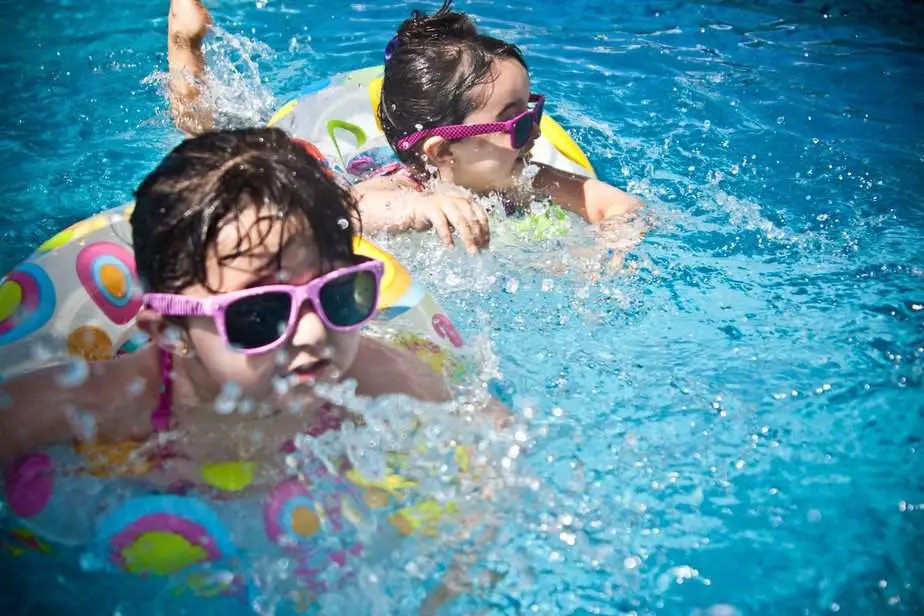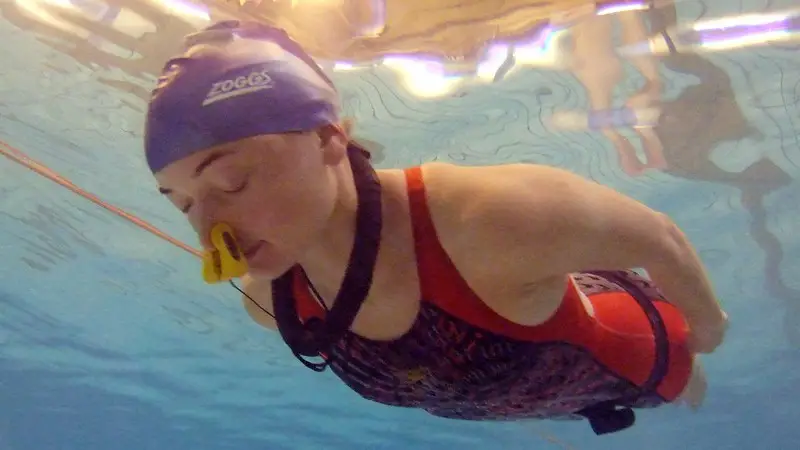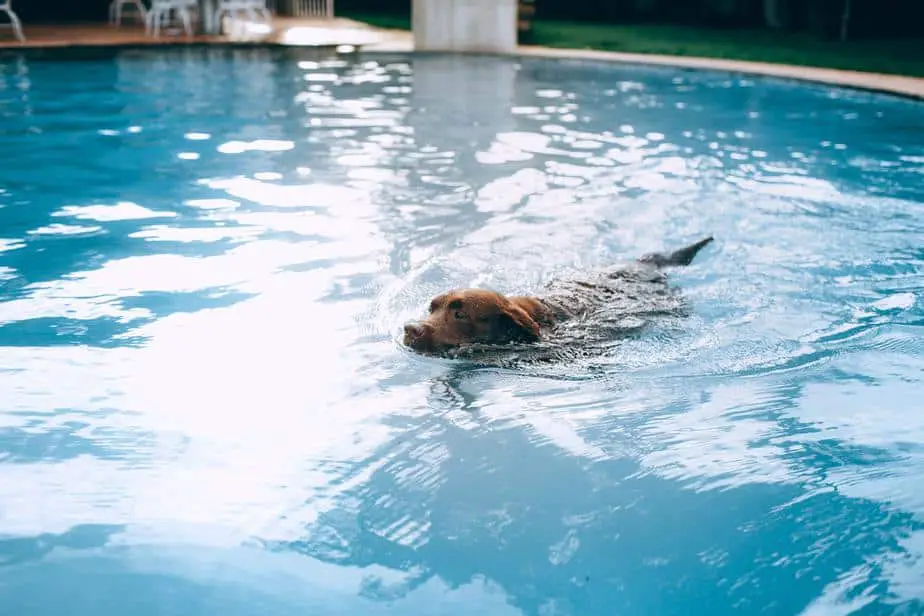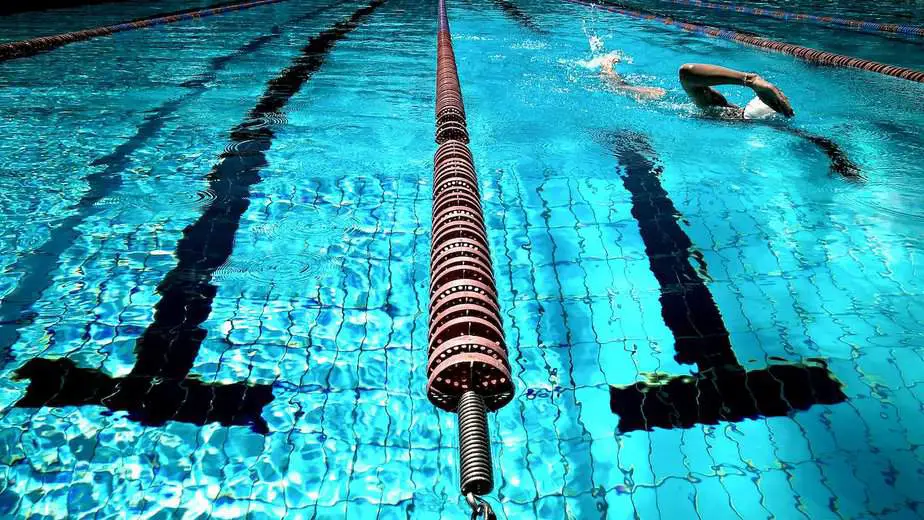In the privacy of your own swimming pool, the only rules are your rules. If you want to do all the stuff that a public pool doesn’t allow, nobody will stop you. That said, you should consider why swimming pools have rules in the first place.
Furthermore, not everyone has their own swimming pool. Most of us swim at public swimming pools, and in order to do that, we must all abide by the swimming pool’s rules and regulations. The purpose of these rules is not to restrict how much fun you have, but to ensure all guests at the pool are safe and so that the pool can operate without issues.
Most of the rules can be summed up as: be considerate of others, don’t do anything that will endanger others or interfere with the normal operation of the pool, and use common sense. For more specifics, you can look up your local swimming pool’s website, call them, or ask them in person. As a few examples, you should wear appropriate swimwear, shower before entering the pool, supervise children under the age of 12, dive only at appropriate areas, and so on.
If it has been a long time since you last went swimming at a public pool, or you’re bringing little kids of your own, it is your responsibility to brush up on the pool rules and regulations. Even if your kids end up doing something wrong, it is the parent or guardian who will face the consequences.
Below, you will find a list of the most common pool rules you should follow. This is not a comprehensive list, and the rules may differ slightly between swimming pools. If you are uncertain about your local swimming pool’s rules, then you should check their website, call them, or ask them about it in person. Most of it is common sense, but some rules may surprise you.
Common pool rules and regulations you should know
Shower before entering the pool
As a courtesy, everyone should use the showers to give themselves a quick rinse before entering the pool. This can help wash off any sweat, dirt, grime, or other contaminants so that they do not make their way into the pool.
Even though the pool is kept sanitary thanks to chlorine, this chemical doesn’t work miracles. Some pathogens can take minutes or even hours before they are killed. In the meantime, these waterborne viruses can still be passed onto guests in the pool.
Additionally, chlorine concentrations must be kept high in order to be effective, and if everyone didn’t shower and intentionally brought in more pathogens into the pool, it can cause the chlorine to be used up quickly.
If you have sensitive hair, showering before you enter the pool will allow your hair to become saturated with water. Chlorine, being a harsh chemical, will strip your hair of its natural oils and cause it to dry out and become brittle. By saturating your hair with fresh water, it will not absorb as much chlorine and will not be as susceptible to its effects.
For these reasons, you should at the very least take a quick rinse in the shower before entering the pool.
Wear appropriate swim attire
![]()
If you want to swim in the swimming pool, you must do so in a swimsuit. It is not acceptable to wear regular clothes or sports attire, such as basketball shorts or a T-shirt. The swimsuit that you wear must also be family friendly; that means no string bikinis or anything too revealing.
One piece swimsuits, bikinis, tankinis, swim shorts, swim briefs, or even wearing swim shorts over a one piece are all considered acceptable swimwear. Some swimming pools allow rashguards, but some don’t because of how loose they can be. Some pools allow babies to wear swim diapers, and others don’t, which basically means babies are not allowed in that specific pool.
It is crucial that you wear swimwear because they are designed to absorb as little water as possible. This allows you to swim without feeling like you are being weighed down by your clothing. Swimsuits also dry very quickly out of the water, which is great if you don’t want to spend all of your time in the water.
Regular clothing and even sports attire will absorb too much water, which weighs you down and obstructs your movement. This is a serious safety concern.
Furthermore, regular clothes are not designed to be exposed to chlorine. Remember, chlorine is a harsh chemical and it can deteriorate your clothing. Your clothing can break down and particles and strands from your clothing can clog the pool filter.
Therefore, not only is wearing normal clothes a safety risk, but it can interfere with the pool’s operation and is strictly not allowed.
We recommend looking at your pool’s dress code to see what kind of swim attire they allow and what kind they don’t.
No running
Kids running around the wet pool deck are at extreme risk of falling and hurting themselves. Water makes the floor slippery and even when walking, one should be very careful.
Kids must be supervised by an adult

Check with your local pool regarding age limits. Typically speaking, any child below the age of 12 should be supervised at all times by an adult, such as their parent, guardian, older sibling, or friend. Even with lifeguards on duty, they are keeping their eyes on dozens of children, and you should specifically be keeping watch of your own.
How closely you must watch your child depends on a few factors. How capable of a swimmer is your child? Is s/he risk averse or a risk taker? Does s/he follow the rules or is s/he one to break them? Also, how deep is the water s/he is swimming in, how busy is the pool, and is there a lifeguard close by?
You can never be too safe in water that you can’t stand up in, so be vigilant whenever your young child is in the pool.
Dive only at designated areas
Diving is risky. Many children have dove headfirst into the shallow end of the pool, causing serious damage to their head, sometimes permanent. Even when diving into the deep end of the pool, you never know if somebody will suddenly appear underneath. Thus, there is a risk to diving.
However, diving boards are a thing. And swimmers dive into the pool in competitions, so obviously diving is allowed under certain circumstances.
Therefore, guests should only dive at designated areas, such as from a diving board. If you want to dive into the pool, you must only do so at the deep end. Dives must be done from a standing position and only from the pool’s edge.
Certain “trick” dives are not allowed, such as dives involving flips, turning, or twisting. You are not permitted to do a running dive or a jumping dive.
Dive only at an area where there is no one nearby and you can visually confirm that there is no one underneath the water either.
No breath-hold dives

Children are often tempted to hold their breath for as long as possible to see who can hold it the longest. They may also try to test their limits by diving to the bottom of the deep end of the pool. Breath-hold dives are extremely risky things to do and even experienced freedivers have blacked out and drowned doing them.
Someone testing the limits of their breath-holding ability may confuse lifeguards into thinking they are drowning or have drowned. Furthermore, the risk of blacking out is high, especially if one hyperventilates prior to doing a breath-hold.
If a pool-goer tries to dive to the bottom of the pool (a.k.a. freediving), then they must know how to equalize the pressure in their ears, otherwise they can hurt their eardrums due to the increased water pressure at depth. There are many risks involved, and therefore any breath-hold dives are not allowed.
Don’t treat the pool like a toilet
Look, I’m not going to act like I’m a saint. I have peed in the pool before. I’m sure everyone has. Even the most decorated Olympian of all time admits to peeing in the pool, and he claims he’s not the only one.
It’s much more convenient than getting out of the water and going to the toilet. The rationale is that the chlorine will take care of the bacteria in the urine. This is also as good of a time as any to remind you that it’s not a good idea to drink pool water either.
Chlorine doesn’t work miracles. It does not immediately kill all of the bacteria in the water. And if everybody in the pool decided that they should collectively pee into it as if it’s a toilet, then it can use up the chlorine rapidly to neutralize all of this bacteria. It’s also just gross to think about how much pee is in the pool; wouldn’t you want there to be less?
Therefore, you should use the bathroom before you go into the pool. And if you actually bother to get out of the pool to use the toilet, you are a saint. That’s what you’re supposed to do, but few people do it.
In a similar vein, babies must wear a swim diaper in the pool. The purpose of the swim diaper is actually to handle a number 2; babies produce such a small amount of urine that it’s not a big deal. Feces is much more of a sanitation issue than urine is, so babies and adults who are incontinent must wear a swim diaper and change out of it as soon as possible if they have defecated into it.
No food or drinks
Food and drink containers or wrappers just introduce more junk that’s going to end up in the pool filters. Furthermore, if any drinks are stored in a glass container, the dangers of it shattering into pieces and entering the pool is too high.
Besides, it’s not comfortable to swim on a full stomach. There is also the risk of someone vomiting or doing a number 2 due to something they ate. Pools just ban all food and drinks so these problems can be avoided.
Don’t block entryways or exits
Stairways and ladders into the pool should always be kept clear so that someone can easily enter and exit the pool. If you want to lounge somewhere, do it at the shallow end along the pool walls but a fair distance away from any entryways or exits.
No pets allowed

Human hair clogging the pool filters is already a concern; imagine how much worse it’ll get clogged up if pets were also allowed into the pool. In a similar vein, many guests already have trouble following the pool’s rules, so pets are likely to be even worse offenders. There is also a safety risk with ill-trained pets being aggressive. It is simply not a good idea to introduce pets to the pool.
Don’t rest on the lane dividers
Lane dividers are intended to act as a literal guide line so that swimmers can stay in their lane. They are not intended for guests to sit and rest on. If you are having trouble staying afloat, then perhaps you should not be pushing yourself so hard, or you should be in the shallow end of the pool.
Parting words
Look, we can’t get into every single swimming pool rule and regulation here, and honestly most of it can be adhered to by simply being a good human being and using common sense.
If you happen to be breaking a rule, a lifeguard or other experienced pool-goer will probably let you know very quickly. If a lifeguard is giving you instructions, follow it and don’t argue with him.
For instance, if your child is having fun splashing people and someone is telling him/her to stop, it’s probably a good idea to stop even if there isn’t explicitly a “no splashing others” rule.
Or when it comes to using a locker, there is a limited supply of lockers to go around, and you are therefore only allowed one locker. Pack accordingly and do not bring too many accessories.
The rules discussed in this article are some of the most common rules that people are likely to break. If you are uncertain of the rules at your local swimming pool, then check their website, call in, or ask them in person to confirm if something is allowed or not.

